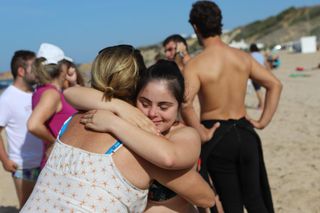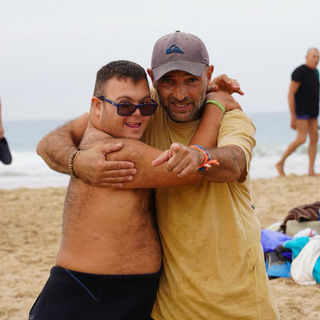- Google Analytics for tracking visits
- Ipcamlive for viewing the 9 Pies webcam
- escueladesurf9pies for accepting GDPR privacy protection
Adaptive surfing in El Palmar

Surfing is not just a sport, but also a powerful therapeutic tool with enormous potential to relax the mind, gain perspective on everyday issues, and strengthen both the body and the mind.
Diversity commitment: 9 Pies surf school and Inclusion
At 9 Pies, we are committed to providing access to therapeutic surfing for individuals with physical, mental, or social disabilities. For over a decade, we have worked with individuals, associations, and various organizations facing special challenges. Our experience has allowed us to address each case in a personalized and effective manner.
A legacy of impact: 10 years of experience
For over 10 years, we have been surfing with individuals, associations, and various organizations with special needs, during which time we have gained the necessary experience to address each case in a focused manner.
Para-Surf: Competition and personal development
Para-surf, especially in the competitive arena, has experienced significant growth in recent years. At 9 Pies surf school, we take pride in having members from various national teams of several countries who choose to train with us.
Training champions: Coaching and support
In our school, we have adapted facilities and specially designed boards to meet the diverse demands faced by our students.
Join Us: Contact 9 Pies
If you're interested in our services, we encourage you to contact us in advance so that we can provide you with the personalized attention you deserve.
Join us at 9 Pies surf school at El Palmar and discover the transformative benefits of therapeutic surfing!
Benefits of physical exercise for people with disabilities

Physical exercise offers a wide range of benefits for people with disabilities, extending beyond physical improvement to encompass emotional and social aspects. Some of these benefits include:
Improved muscle development and endurance
Exercise contributes to the development of muscle power and helps improve resistance to fatigue, which is essential for maintaining an active and healthy lifestyle.
Enhanced vital functioning
Particularly, exercise benefits vital functioning such as breathing, cardiovascular function, and kidney function, contributing to better quality of life and overall well-being.
Strengthening of self-esteem and emotional Well-being
Engagement in physical activities promotes the development of self-esteem and aids in emotional adjustment, fostering a more positive attitude towards oneself and life's challenges.
Promotion of socialization and sense of belonging
Exercise also fosters socialization and a sense of belonging to the group, as it provides opportunities to interact with others and form meaningful connections, which contributes to greater emotional and social well-being.
Improved skeletal support and complication prevention
Exercise contributes to improving skeletal support, which helps prevent complications such as bone loss and osteoporosis, thus promoting greater independence and quality of life.
Reduction of depression and anxiety
Regular physical activity has been shown to be effective in reducing depression and anxiety, providing a natural means to improve mood and promote emotional well-being.
Promotion of community engagement and social Inclusion
Exercise increases the participation of people with disabilities in community activities, fostering greater social inclusion and contributing to a more diverse and equitable society.
In summary, physical exercise not only improves physical health but also promotes the emotional and social well-being of people with disabilities, resulting in better quality of life and greater inclusion in society.







